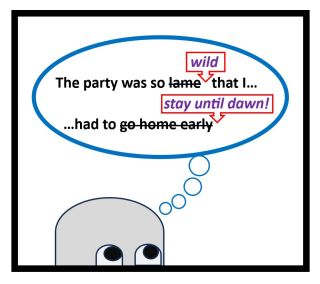Memory
Editing Your Autobiography
Sometimes, we modify memories of our personal experiences for a better story.
Updated February 8, 2024 Reviewed by Ray Parker
Key points
- Inadvertent changes happen to our memories, but sometimes, we take control and create our own modifications.
- Our autobiographical edits may include removing details, adding embellishments, or smoothing over rough spots.
- Most people do such edits to enhance social connection, but these can become problematic with some audiences.

It is well known that our memory is an imperfect record of our experiences. Gaps, alterations, and inadvertent substitutions can creep in over time through no fault of our own. Fortunately, most such errors are innocuous and usually ignored by others.
Hasan Minhaj's Story
But what happens when we actively modify our recollections, perhaps adding, deleting, or modifying important details to craft a better story? Recently, Hasan Minhaj ran into a problem doing just this. He is an award-winning stand-up comedian and host of Patriot Act, a Netflix political satire show.
An article about Minhaj appeared in The New Yorker magazine late last year, describing how, in a streaming special, he embellished several personal life incidents with details that had not occurred. In one of these events, Minhaj claimed to have opened a letter at home that contained a mysterious white powder while standing beside his daughter. As a precaution, he supposedly took her to a hospital in case the substance happened to be anthrax. (It wasn’t.)

In following up on details in this interview, The New Yorker journalist discovered that Minhaj’s daughter had not been exposed to the powder as she was not even near him, nor did he take her to the hospital. Furthermore, there is no record that he reported the incident to the authorities. In short, in crafting an entertaining but impactful personal story, Minhaj intentionally revised his personal experience. Although the basic core was correct, some important details were not.
This revelation stirred up a complicated controversy among both fellow artists and reporters: How far can someone bend their personal experiences in the service of artistic expression? Minhaj subsequently came clean and owned up to making these modifications but argued that such alterations were acceptable in supporting the emotional message that he was trying to convey.
Autobiographical Editing Survey
Before judging Minhaj, we need to consider whether we noncelebrities adhere to such strict accuracy in managing our own stories. Several years ago, some colleagues and I conducted a survey investigation (Brown et al., 2020) concerning how common it is to edit one’s autobiographical events to produce a “better” story. We discovered that most of us do exactly this.
Over three-quarters of both college and community samples (over 800 surveyed) in Brown et al. (2020) admitted to some form of autobiographical embellishment: filling in memory gaps with plausible details; combining similar experiences into one; or rectifying regretted words or deeds by “overwriting” them with better ones.
So, most of us edit our autobiographies, but how do we feel about it? Is it a big deal? Apparently, not so much. More respondents said that edits were acceptable (43 percent) than not (36 percent), while the rest (21 percent) had no opinion. So, a plurality views burnishing autobiographical memories as not all that bad. On the bright side, most who did such edits had benevolent (enhancing social connections) rather than self-centered (looking better) motives.
Perhaps most important is what happens when others notice our autobiographical alterations. Thankfully, most of us only get confronted by our sister at the Thanksgiving meal or a colleague at the office happy hour, and we escape with little reputational damage. However, celebrities may have to deal with more serious consequences. While Minhaj received harsh treatment in the press, he did apologize and clarify why he made embellishments and so may avoid long-term repercussions.
Brian Williams's Story
In contrast, Brian Williams’s experience did not turn out so well. While reporting on the Afghanistan war a few years ago, he claimed to have been riding in a helicopter disabled by enemy fire and forced to land. Actually, it was another helicopter nearby that was hit, not his. When this came to light, Williams was removed from his anchor spot on the NBC Nightly News. His autobiographical edit led to a worse outcome, probably because of his position as a news anchor and the fact that he did not take responsibility for the mistake but rather put forth some implausible excuses involving mental processes gone awry.
Conclusions
On a personal level, we need to be honest with ourselves about how flexible we are concerning the guardrails around the accuracy of our memory. Although most of us have made autobiographical edits, we need to be careful that these do not overwrite and become the original experience.
And if caught in our creative life-story adjustments, can we ”fess up” and have a good laugh at ourselves? Most people will likely forgive you because they have probably done the same thing. And if you catch others in their edits, remember that they may just be trying to bond with you.
So, we should perhaps cut Minhaj some slack: He was trying to connect with us better, and what more could we ask of our favorite performers?
References
Brown, A. S. (2018). "May I borrow your life? On second thought, I’ll edit my own." Presidential Address presented at the Southern Society for Philosophy and Psychology, San Antonio, TX.
Brown, A. S., Fields, L. M., Croft Caderao, K., Chmielewski, M., Denman, D., &Marsh, E. J. (2020). Autobiographical editing: Rewriting our personal past. In B. L. Schwartz & A. M. Cleary (Eds.), Quirks of memory: The study of odd phenomena in memory. NY: Routledge.




